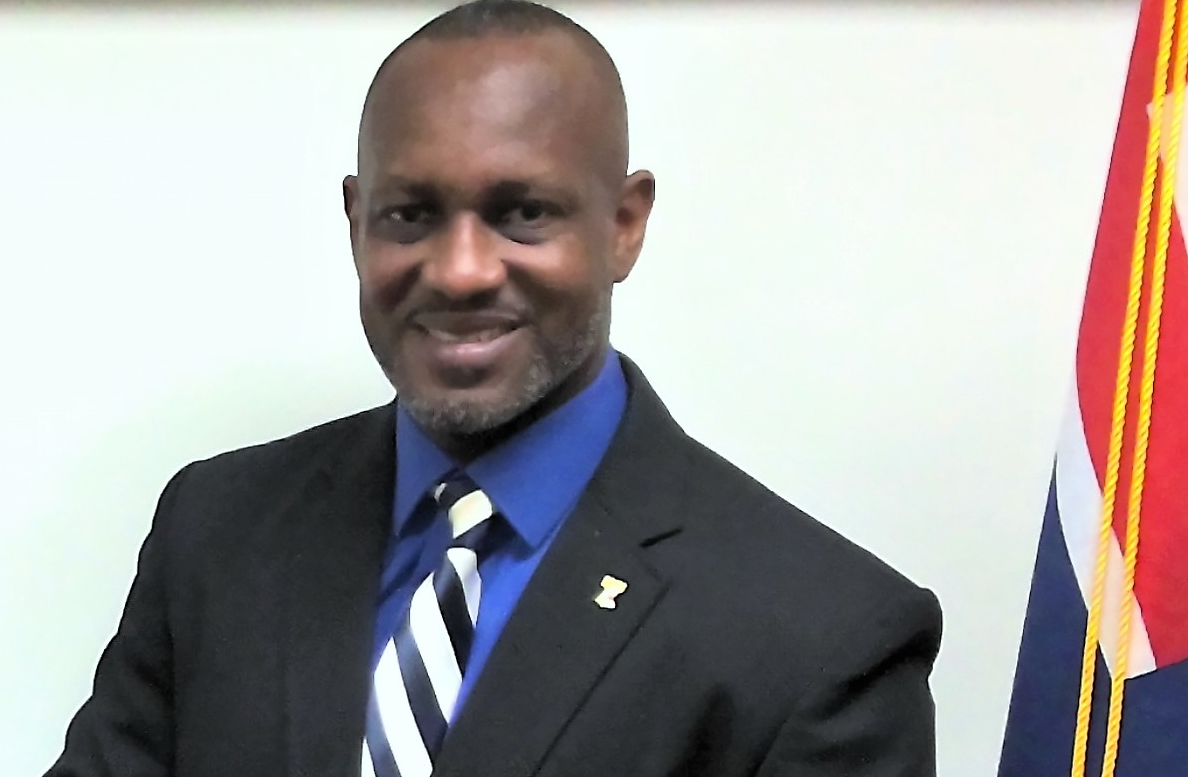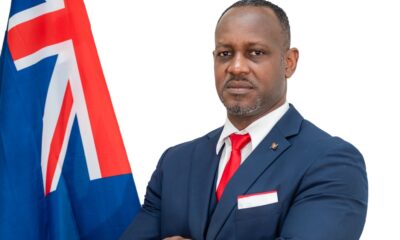Caribbean News
PDM Announces Plan to Stop the Sloops’; says PNP Gov’t is “clueless”
Published
3 years agoon

By Deandrea Hamilton
Editor
#TurksandCaicos, February 2, 2023 – For some, the Progressive National Party government has failed to contain the illegal migration problem. To no one is this perspective more true than the People’s Democratic Movement which in a statement, hammered the government for inaction on stemming the flow of illegal boats from embattled Haiti and cited that now, there are a marked increase in human smuggling operations since the PNP took office.
“The PNP Government of the day seems to be clueless about how to tackle this problem. In the two years that they had come for the work, the country has seen no new plans, strategies, or methods for addressing the illegal movement of people, weapons, drugs, and contraband. On the contrary, we have seen an increase in illegal activities within our territorial waters,” said Edwin Astwood, Opposition Leader.
Over 500 Haitians have been caught so far in 2023 trying to enter the islands, illegally. Police have confirmed that some illegal boats have been missed by the coastal radar and marine branch, which brings unknown dangers to the British overseas territory.
some illegal boats have been missed by the coastal radar and marine branch, which brings unknown dangers to the British overseas territory.
The overwhelming influx is fueled by people seeking relief from a toxic cocktail of widespread infections and deaths as a result of Cholera; the vacuum left by the expiration of term in office of all its democratically elected leaders; the high cost and scarcity of food and the take-over of murderous gangs across the nation.
Astwood said the remedy needs funding and his party has the right strategy.
“The PDM has been working on a very ambitious strategic plan for “Stopping the Sloops”. This plan has a clearly defined vision and mission, with achievable objectives. The strategy was developed with a new and innovative way of stopping and detecting illegal entry into the Turks and Caicos Islands. It employs a multisectoral multiagency approach using new and very promising tactics.”
No details of this plan is shared by Astwood, but he does give clues about where there is grave concern; he slams the PNP for leaving smaller islands unprotected. He likened them to a magnet for the unscrupulous captains who use the lanes and lands for their often ill-fated, always nefarious and irresistibly lucrative voyages.
“For our Family Islands and communities border protection and security are extremely low, or completely absent, hence they also act as alternative unmonitored landing sites for these illegal boats.
We the PDM have been studying in much detail every aspect of this issue of illegal boats. Our Plan will coordinate our intelligence, interception, processing, and enforcement systems. Through increases in the critical staffing areas; increase policing of our waters; use of technology, including sensors, radar, and aerial assets, investments to modernize the ports of entry, and stronger partnerships and information sharing, we the PDM desire to create a safer, more secure, and more efficient border environment of the entire Turks and Caicos Islands.”
Since the statement was issued on February 18, there has been no formal reply from the PNP Administration. The issue of illegal migration once again proving to be politically polarizing and not severe enough a threat to elicit greater collaboration by the two parties for the good of the country, which is pumping millions of dollars into repatriation costs and bleeding even more dollars due to the social impacts resulting from the deepening crisis in Haiti.
“Protecting our borders from the illegal movement of weapons, drugs, contraband, and people, while promoting lawful entry and exit, is essential to our country, the Turks and Caicos Islands, security, economic prosperity, and national sovereignty.
A PDM government would be committed to enforcing our immigration laws so that we can secure our border and keep the TCI people safe. Our Strategy includes taking action to directly disrupt cartels, smugglers, and nefarious actors.
However, smugglers, human traffickers, and nefarious actors know our loopholes well and continue to exploit them. To truly keep the TCI people safe, we must end loopholes that have left us with policies that serve as tremendous magnets for illegal immigration.”
The plan is to stop the sloops.
“It consists both of a short-term and a long-term plan.
No doubt this Strategy will require budgetary support from Government funding, and New Visionary Leadership for execution and bringing the Plan to fruition. “A new and innovative plan will never be executed with an old and outdated way of thinking.”
The funding will be for acquiring the most suitable and most effective technologies for the purpose, the most suitable and most effective equipment for the activities, implementing the new methodologies, and most importantly employing the most suitable and skilled Turks and Caicos Islanders for organizing and executing the approach.”
There is a document and a vision said Edwin Astwood, who is a former minister of health of the Turks and Caicos Islands.
“We the Peoples’ Democratic Movement believe that the TCI should be free from having to face the consequences of illegal boats carrying people, guns, and illegal drugs reaching our shores. We are committed to securing our borders, and developing and enforcing effective immigration laws. We also believe that all of our people and residents have a right to feel safe and protected. 
The mission statement of the PDM’s New and Innovative Plan outlines how we would achieve the vision. Our Objectives comprise the specific results that our new system aims to achieve in “stopping the boats”, within the specified timeframe stated.
The PDM’s plan needs the Haitian Government, said the Leader who is depending on a missing in action level of accountability from the Haitian government. It is a murky, maybe even a doomed expectation as Haiti’s government is relatively non-existent. Its last elected president – Jovenel Moise – was assassinated in July 2021 and its remaining democratically elected leaders demitted office in early January 2023.
“We need both countries to be in agreement to work together to address this expanding illegal immigration from Haiti, while at the same time promoting trade and commerce.
We the PDM believe that by working cooperatively, both governments will work to combat human smuggling and trafficking in the region, and support both countries in our efforts to combat crime and violence, by cutting off this funding mechanism. These efforts will build on existing bilateral agreements between the TCI and our neighboring countries and will reflect a shared commitment toward regional and hemispheric security.”
For Haiti, despite optimism when the United States and Canada agreed to ‘boots on the ground’ and military support, little had changed for the nation, home to 11 million people including some five million starving children. This month, both countries informed that while they are prepared to sanction alleged corrupt ex-leaders and provide a presence, no combat action is planned.
The PDM, meanwhile, has not said when they plan to release the strategy for public consumption.
“We the PDM have a new and Innovative Plan to protect You, to secure our borders, and to Stop the Illegal Boats. The Premier and his PNP government have No plan,” said Edwin Astwood in conclusion.
You may like
-


Opposition Leader Meets with Governor, Calls for National Strategy to Curb Gun Violence
-


Statement from the Leader of the Opposition on the Recent Tragedy in Providenciales
-


ILLEGAL MIGRANT SURGE AND CRIME SPIKE ACROSS TCI SPARK MAJOR SECURITY ALERT
-


Two Realities, One Country: Opposition Leader Slams Government’s ‘Disconnected’ $540M Budget
-


InterHealth Canada awarded $17.1 Million; former Health Ministers explain why
-


Opposition PDM Issues Statement on the Recent Changes to the National Health Insurance Board
Caribbean News
Seven Days. Seven Nations. One Storm — Hurricane Melissa
Published
3 months agoon
November 1, 2025
A week of wind, water, and heartbreak
From Haiti’s hillsides to Bermuda’s reefs, seven Caribbean nations have been battered, bruised, and forever marked by Hurricane Melissa — a storm that tested not only the region’s infrastructure but its unshakable spirit of unity.
Saturday–Sunday, October 25–26 – The First Strike: Hispaniola
Before the storm even earned its name, torrential rain and flash floods swept across Haiti and the Dominican Republic, claiming lives and tearing through rural communities.
tearing through rural communities.
In southern Haiti, rivers burst their banks, swallowing roads and homes; 23 people were confirmed dead by Sunday evening. Across the border, one death was reported in the Dominican Republic as swollen rivers cut off villages in Barahona and Pedernales.
By nightfall, the tropical system had strengthened — and the Caribbean knew it was facing something historic.
Monday, October 27 – Evacuations and Airlifts
In The Bahamas, Prime Minister Philip Davis issued a mandatory evacuation for the MICAL Islands — Mayaguana, Inagua, Crooked Island, Acklins, Long Cay, and Ragged Island.
Bahamasair added extra flights as the nation braced for what forecasters warned could become the strongest storm in nearly two decades.
Meanwhile, Jamaica, Turks & Caicos, and Cuba activated their national emergency operations centers.
Tuesday, October 28 – Jamaica and Haiti Hit Hard
By afternoon, Hurricane Melissa made landfall near St Elizabeth, Jamaica, as a Category 5 hurricane — winds of 185 mph, central pressure 892 mb, the lowest ever recorded so close to the island.
Roads collapsed, bridges washed away, and Black River Hospital lost its roof. Power failed for 72 percent of the island.
BOJ TV footage shows split asphalt, sparking lines, and flooded communities abandoned for safety.
Initially four were reported dead, that grew to seven deaths and heavy damage in 170 communities; Andrew Holness, Jamaican Prime Minister calling it “a national test of resilience.”
Haiti, still recovering from the weekend’s flooding, was hit again as outer bands dumped more rain on Les Cayes and Jacmel, deepening the humanitarian crisis.
Wednesday, October 29 – Crossing to Cuba
Weakened slightly to Category 4 (145 mph), Melissa tracked north-northeast at 8 mph, hammering eastern Cuba with hurricane-force winds
and mudslides. Over 15 000 people were evacuated from Santiago de Cuba and Holguín.
In Turks & Caicos, the Regiment deployed to Grand Turk, Salt Cay, South, North and Middle Caicos, preparing shelters and securing public buildings.
Thursday, October 30 – The Bahamas and the All Clear
Melissa’s speed increased, sparing the northern Caribbean its worst.
The Bahamas Airport Authority closed 13 airports from Mayaguana to Exuma International; none reported casualties, though infrastructure suffered.
In Turks & Caicos, the all-clear came early Thursday after minimal impact. Premier Washington Misick expressed gratitude and pledged support for neighbors:
“We must act — not only with words, but with compassion and deeds.”
Friday, October 31 – Counting the Cost
By Friday, Melissa had weakened to Category 3 (120 mph) north of Cuba.
The Bahamas Department of Meteorology issued its final alert, lifting warnings for the southern islands.
Regional toll:
- Haiti: 23 dead, thousands displaced.
- Jamaica: 7 dead, 170 communities damaged; 72% without electricity
- Cuba: 2 dead, 15, 000 evacuated.
- Dominican Republic: 1 dead, flooding in southwest.
- Bahamas: 0 dead, minor infrastructure damage and flooding in southeast.
- Turks & Caicos: minimal to no impact.
Relief and Reconnection
The Cayman Islands became the first government to touch down in Jamaica post-storm. Premier Juliana O’Connor-Connolly led a contingent bringing a plane-load of essentials and pledged US $1.2 million in aid.
Reggae icon Shaggy arrived on a private jet with friends, delivering food, medical kits, and hygiene supplies.
Meanwhile, Starlink and FLOW Jamaica activated emergency satellite internet across Jamaica providing free connectivity through November.
From overseas, U.S. President Donald Trump, speaking during his Asia tour, announced that American search-and-rescue teams and disaster aid will support the region.
“They can depend on U.S. assistance as they recover from this historic storm,” he said.
Faith, Funds, and False Websites
The Government of Jamaica and the Sandals Foundation have both launched verified donation portals for recovery. Officials are warning against fake crowdfunding pages posing as relief sites and urging donors to use only official channels.
A Seventh Nation in the Crosshairs – Bermuda
As Hurricane Melissa left the Caribbean basin, Bermuda found itself next in line.
Forecasts indicated the storm would pass just west of the island late Thursday into Friday, likely as a Category 1 to 2 hurricane with sustained winds near 105 mph.
Though far weaker than when it ravaged Jamaica, officials issued a hurricane warning, urging residents to secure property and expect tropical-storm conditions.
By all appearances Bermuda is heeding the warnings
The Human Response
Across the Caribbean, solidarity surged.
The Global Empowerment Mission (GEM) in Miami began airlifting relief supplies, while churches, civic groups, and businesses in The Bahamas and Turks & Caicos organized drives for displaced families.
“Your dedication gave our islands the strength to face the storm,” Premier Misick said. “Together, as one Caribbean family, we will rise stronger.”
Resilience in the Wake
Melissa’s winds may have faded, but her impact endures. Engineers are inspecting bridges, hillsides, and water systems; volunteers are clearing debris and distributing aid in communities still cut off.
From Haiti’s ravaged river valleys to Jamaica’s sugar towns, from Cuba’s eastern hills to The Bahamas’ salt ponds and Bermuda’s reefs, the region once again stands at the crossroads of ruin and renewal — and leans, as always, toward hope and a faithful God
Caribbean News
Haitian Pushback Halts Controversial Constitution Rewrite — What’s Next?
Published
3 months agoon
October 15, 2025
Deandrea Hamilton | Editor
Haitian media, legal scholars and civic voices did what bullets and barricades couldn’t: they stopped a sweeping constitutional overhaul widely branded as anti-democratic. Editorials and analyses tore into proposals to abolish the Senate, scrap the prime minister, shift to one-round presidential elections, expand presidential power, and open high office to dual-nationals—a package critics said would hard-wire dominance into the executive at a moment of near-lawless insecurity.
The Venice Commission—Europe’s top constitutional advisory body—didn’t mince words either. In a formal opinion requested by Haiti’s provisional electoral authorities, it pressed for clear legal safeguards and credible conditions before any referendum, including measures to prevent gang interference in the electoral process—an implicit rebuke of pushing a foundational rewrite amid a security collapse.
Facing that drumbeat, Haiti’s Transitional Presidential Council has now formally ended the constitutional-reform initiative. The decision, taken at a Council of Ministers meeting at the National Palace, effectively aborts the rewrite track that has haunted Haiti since the Moïse and Henry eras.
So what now? Per the Miami Herald, the pivot is back to basics: security first, elections next. That means stabilizing Port-au-Prince enough to run a vote, rebuilding the electoral timetable, and empowering the provisional electoral machinery—none of which is simple when gangs control vast chunks of the capital and state authority remains fragile. Recent headlines underline the risk: gunfire has disrupted top-level government meetings, a visceral reminder that constitutional theory means little without territorial control.
Bottom line: Haitian journalists and public intellectuals helped slam the brakes on a high-stakes centralization of power that lacked legitimacy and safe conditions. International constitutional experts added weight, and the transition authorities finally conceded reality. Now the fight shifts to making an election possible—clean rolls, secure polling, and credible oversight—under circumstances that are still hostile to democracy. If the state can’t guarantee basic safety, any ballot is theater. If it can, shelving the rewrite may prove the first real step back toward consent of the governed.
Caribbean News
Political Theatre? Caribbean Parliamentarians Walk Out on House Speaker
Published
3 months agoon
October 14, 2025
By Deandrea Hamilton | Magnetic Media
October 14, 2025 – It’s being called political theatre — but for citizens, constitutional watchdogs, and democracy advocates across the Caribbean, it feels far more serious. Within a single week, two national parliaments — in Trinidad and Tobago and St. Kitts and Nevis — descended into turmoil as opposition members stormed out in protest, accusing their Speakers of bias, overreach, and abuse of parliamentary procedure.
For observers, the walkouts signal a deeper problem: erosion of trust in the very institutions meant to safeguard democracy. When Speakers are viewed as political enforcers instead of neutral referees, parliaments stop functioning as chambers of debate and start performing as stages for power and spectacle — with citizens left wondering who, if anyone, is still accountable.
October 6: St. Kitts Parliament Erupts
The first walkout erupted in Basseterre on October 6, 2025, when Dr. Timothy Harris, former Prime Minister and now Opposition Leader, led his team out of the St. Kitts and Nevis National Assembly in a protest that stunned the chamber.
led his team out of the St. Kitts and Nevis National Assembly in a protest that stunned the chamber.
The flashpoint came as the Speaker moved to approve more than three years’ worth of unratified parliamentary minutes in one sitting — covering 27 meetings and three national budgets — without individual review or debate.
Dr. Harris called the move “a flagrant breach of the Constitution and parliamentary tradition,” warning that the practice undermines transparency and accountability. “No serious parliament can go years without approving a single set of minutes,” he said after exiting the chamber.
The Speaker defended the decision as administrative housekeeping, but critics were unconvinced, branding the move a “world record disgrace.” The opposition’s walkout triggered renewed calls for the Speaker’s resignation and sparked a wider public discussion about record-keeping, accountability, and respect for parliamentary norms in St. Kitts and Nevis.
October 10: Trinidad Opposition Follows Suit
Four days later, on October 10, 2025, the Opposition United National Congress (UNC) in Trinidad and Tobago staged its own walkout from the House of Representatives in Port of Spain.
The UNC accused the Speaker of partisan bias, claiming she had repeatedly blocked urgent questions, ignored points of order, and allowed government members to breach standing orders without consequence.
“The Speaker has failed in her duty to act impartially,” the Opposition declared in a statement. “Parliament is not the property of any political party or Presiding Officer.”
The dramatic exit was seen as a culmination of months of rising tension and frustration, with opposition MPs arguing that parliamentary rules were being selectively applied to silence dissenting voices.
Political analyst Dr. Marcia Ferdinand described the twin walkouts as “a warning sign that parliamentary democracy in the Caribbean is teetering on the edge of performative politics.”
“When chairs become political shields rather than constitutional referees,” she said, “democracy becomes theatre, not governance.”
A Pattern Emerging
While St. Kitts and Trinidad are very different political environments, both incidents point to the same regional fault line: the perception that Speakers — the guardians of parliamentary order — are no longer impartial.
In Westminster-style systems like those across the Caribbean, the Speaker’s authority depends not on power but on public confidence in fairness. Once that credibility erodes, parliamentary control collapses into confrontation.
Governance experts say the implications are serious: eroded trust between government and opposition, declining public confidence in state institutions, and growing voter cynicism that “rules” are flexible tools of political advantage.
Why It Matters
Parliamentary walkouts are not new in the Caribbean, but what makes these recent events different is their frequency and intensity — and the regional echo they’ve created. Social media has amplified images of lawmakers storming out, with citizens from Barbados to Belize questioning whether the same erosion of decorum could be happening in their own legislatures.
the regional echo they’ve created. Social media has amplified images of lawmakers storming out, with citizens from Barbados to Belize questioning whether the same erosion of decorum could be happening in their own legislatures.
Analysts warn that if this perception takes hold, it risks diminishing the moral authority of parliamentary democracy itself.
“Once opposition MPs believe the rules are rigged, and once citizens believe Parliament is just performance,” said one Caribbean governance researcher, “you’ve lost the most valuable currency in democracy — trust.”
Restoring Balance
Political reformers across the region are calling for tighter Standing Order enforcement, independent parliamentary service commissions, and training to strengthen Speaker neutrality. Civil society leaders say the public must also play its part by demanding transparency and refusing to normalize partisan manipulation of parliamentary procedure.
Whether these twin walkouts become catalysts for reform — or simply another episode of Caribbean political theatre — will depend on what happens next inside those chambers.
For now, democracy watchers agree on one thing: when opposition leaders feel the only way to be heard is to walk out, the entire democratic house — not just its Speaker — is in danger of collapse.
Angle by Deandrea Hamilton. Built with ChatGPT (AI). Magnetic Media — CAPTURING LIFE.








